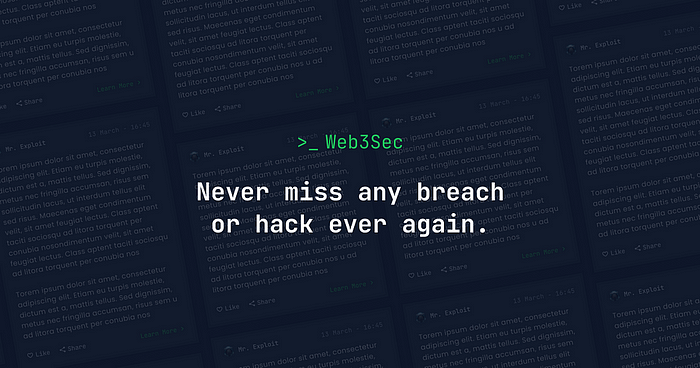Smart Contract Vulnerabilities Audit Checklist 2023
List of Smart Contract Security Vulnerabilities for Auditing

Introduction
- While we learn to audit smart contracts and be creative in detecting vulnerabilities, it is critical to have a comprehensive checklist of typical vulnerabilities that can be used as a reference to auditing a smart contract written in solidity.
- This checklist will help you audit Solidity code so that you can test for different known vulnerabilities with confidence and accuracy.
Join the Vibrant Web3 security Community Today 🤝
How to keep track of hacks & smart contract vulnerabilities?
- It is really difficult to keep track of all hacks and alerts in one place. you need to follow various news & Twitter researcher accounts to get the latest hacks and vulnerability updates on your timeline.
- To solve the above problem, I recently created an open-source platform that aggregates the tweets & resources shared on the latest hacks & vulnerabilities. It also promotes the Web3 Security Community by providing them with the recognition they deserve.

- web3sec.news is a community aggregator platform that tracks the latest hacks, learning resources, audit reports, jobs, etc in one place for everyone to learn & excel in blockchain security.

List of Common Solidity Smart Contract Vulnerabilities
- Reentrancy (ERC721, ERC1155, ERC777)
- Sandwich attacks (front-running/back-running)
- Flash loan attacks (oracle manipulation)
- Block stuffing
- DoS with revert or infinite gas consumption
- DoS due to Underflow
- Metamorphic contracts (bytecode mutation)
- Signature replay attacks
- Short address attacks (Solidity <0.5.0)
- Token approval Griefing
- Unexpected non-zero ether balance (self-destruct)
- Calls to arbitrary contracts
- Every address can accept ether leads to DoS
- Force-feeding attacks
- Weak on-chain randomness (prevrandao)
- Unbounded loops (pagination)
- Unbounded gas consumption by returning a lot of data
- Default Enum values
- Duplicate array elements
- Hash collisions with dynamic types (packed ABI encoding)
- Storage collisions with delegate call
- Function selector collisions (zero selectors)
- Wrong inheritance order
- Strict Equalities DoS
- Integer overflow/underflow (Solidity <0.8.0)
- Lack of precision in calculations
- Access control via tx.origin
- Problems with ERC20 decimals
- Mis-initialization of contracts (ownership/proxy)
- Private key leaks in .env files
- Directional character (U+202E) usage (Solidity <0.7.6)
- Compiler bugs
- Price Oracle Manipulation
- Unlimited Token allowance
- Lack of Access Controls
- Asserting contract from Code Size
- Delegate call to Untrusted Callee
- Unsafe Typecast
- Write to Arbitrary storage collision
- Insufficient User-Input Validation
- Unchecked return value
- Message call with hard-coded gas
- Short Address attack
- Divide before multiplying
- Unsafe Ownership transfer
- Improper Array Deletion
- Dirty High Order Bits
- Floating Point Arithmetic
- Unexpected Ether Leading to DoS
- Use of deprecated solidity Functions
- Check for Gas Optimizations
- Forcefully Send Ether with Selfdestruct
- Hidden malicious code
- Honeypots
- On-chain & off-chain data handling
- Ineffective key-management
- Transaction order manipulation
- Governance-related vulnerabilities
- Incorrect Integration
- Vulnerable Rebalancing/Buyback Mechanics
- Faulty Native Token handling
- Serialization/Parsing Issues
- Naive Trust Assumptions
- Uninitialized Proxies
- Reinitialization Vulnerability
- Incorrect Special Character Handling
- Botched Upgrades
- Governance Takeovers
- Flawed Math
- Transaction Replay Attack
- Logic Errors
- Exploiting Approvals
- Gas Siphoning
- UI Issues
- Check for Business Logic Vulnerabilities
- Check for correct inheritance
- Check if the spot price from an AMM as an oracle is used
- Check for tokens that use too many or too few decimals
- Check if internal accounting is mixed with actual balances
- Check if the Contract approves tokens before transferFrom to avoid revert
- Check if state variable layout is followed when using delegate-call in proxy contracts
- Check if events are emitted on critical functions
The checklist was created by conducting research on numerous open-source blogs and websites. Thank you to everyone in the web3sec community who shared their knowledge and expertise with us.
I aim to keep updating this with new vulnerabilities so that you don’t miss any flaws during an audit.
Thank you for reading ✌🏻
Take care, fellow hackers!
Happy Hunting :>
You can connect with me on LinkedIn, or Twitter for more such insights!











